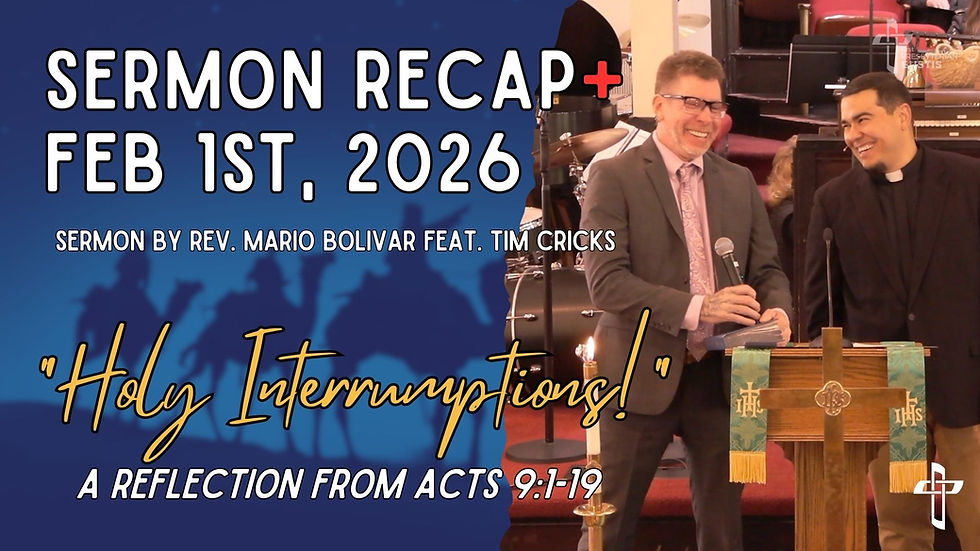Sermon Recap, Jan 21, 2024
- Mario Bolivar
- Jan 23, 2024
- 4 min read
Doubt is a concept that many view with apprehension. It's often seen as a stumbling block on the path of faith. However, what if we reframed doubt as a stepping stone to spiritual growth? Doubt is not something to be feared; it is a natural part of our journey that urges us to ask better questions, seek more profound answers, and, ultimately, mature in our faith.
Just as people have unique approaches when navigating a new grocery store, they also follow diverse routes on their spiritual quests. Some individuals seek guidance from others, while others rely on their inner instincts. The crucial realization here is that there is no one-size-fits-all method for exploring faith; each person's journey is unique.
One of the pivotal questions that often arises in discussions about faith concerns the destiny of those who do not adhere to the Christian path. So, then, what about the 68% of people worldwide who do not recognize Jesus as their Lord? Are they destined for eternal torment? These questions, though challenging, serve as a catalyst for deeper introspection and examination of our faith. This is a question to which I won't provide an answer, but extend a mirror towards you… Christians must have a sense of humility when talking or questioning the faith of others.
In an era marked by rapid change, our approach to spirituality and faith must also adapt. Congregations have embraced online meetings and worship services, acknowledging the evolving ways in which people connect with their beliefs. This adaptability is not merely about convenience; it is a testament to the enduring nature of faith, which can thrive even in changing circumstances. Now, it is worth adding (And I didn’t say it in the sermon… I do better next time) In the words of Mike Winslow… which he shared with me on social media after listening to the sermon… an “Important takeaway is that true faith in Christ should produce good works, and our actions can reveal the genuineness of our faith. However, salvation itself is ultimately a gift from God received through faith, not earned through our actions.”
Adam Hamilton, in chapter 3 of his thought-provoking book, challenges traditional notions of Salvation for those outside of the Christian faith—Prayerfully prompting us to question what it is that we believe concerning others. Pastor Hamilton questions whether individuals of different faiths who exhibit kindness, care, and love should be condemned simply because they haven't accepted Jesus. This perspective shift invites us to ponder a more profound purpose – one grounded in love for God and our fellow human beings because the world struggles with the hypocrisy of Christians who fail to remember… Matthew 7:21: “Not every one that said to me, Lord, Lord, shall enter into the kingdom of heaven; but he that does the will of my Father which is in heaven."
So from that, I ask… What are we to do with those who claim Jesus as Lord but don’t behave like Jesus is their Lord? What are we to do with those who profess Jesus as Lord but live a hypocritical life, where they might praise the Lord on Sunday morning but hate their neighbor and do not follow Jesus’ will or commandments? What are we to do with Christians who look/talk righteous but do not love their neighbor? What are we to do with the rest of the 68% of humans who, for whatever reason, can’t, won’t, don’t know to profess Jesus as Lord, but behave accordingly and love their neighbor?
In 1 Timothy 2:1-6, underscores the importance of prayer for all people, not just for fellow believers. It calls for intercession on behalf of others and gratitude for their presence in our lives. This passage emphasizes that faith is not solely about professing beliefs but about embodying Christ's love in our actions. Let us remember that Faith without works is dead.
Works without faith are pointless.
For those who are asking, “Where are They Going?” I will say, pay attention (see, Matt 7:3-5 ) to the log of your eye. For not everyone that said to me, Lord, Lord, shall enter into the kingdom of heaven; but he that does the will of my Father which is in heaven." See, Matthew 7:21.
Matthew 25:31-46 presents a compelling message about separating the righteous from the wicked. What's intriguing here is that this separation is not solely based on faith declarations; it hinges on how we treat others. It underscores that salvation criteria extend beyond mere professions of faith, compelling us to reflect and reveal Christ's unselfish love in every aspect of our lives.
In conclusion, the path of faith is not about avoiding doubt or clinging to rigid beliefs. Instead, it is a journey of love, compassion, and reflection. Doubt is not the enemy; it is the guide that propels us towards a deeper understanding of our faith. Our role as Christians is not just to avoid hell but to love God and our neighbors unconditionally.
In a world that is constantly evolving, let us lead with love and compassion. Let us engage in profound conversations, reach out to those who may not share our beliefs, and exemplify the essence of our faith journey. To God be the glory.





Comments